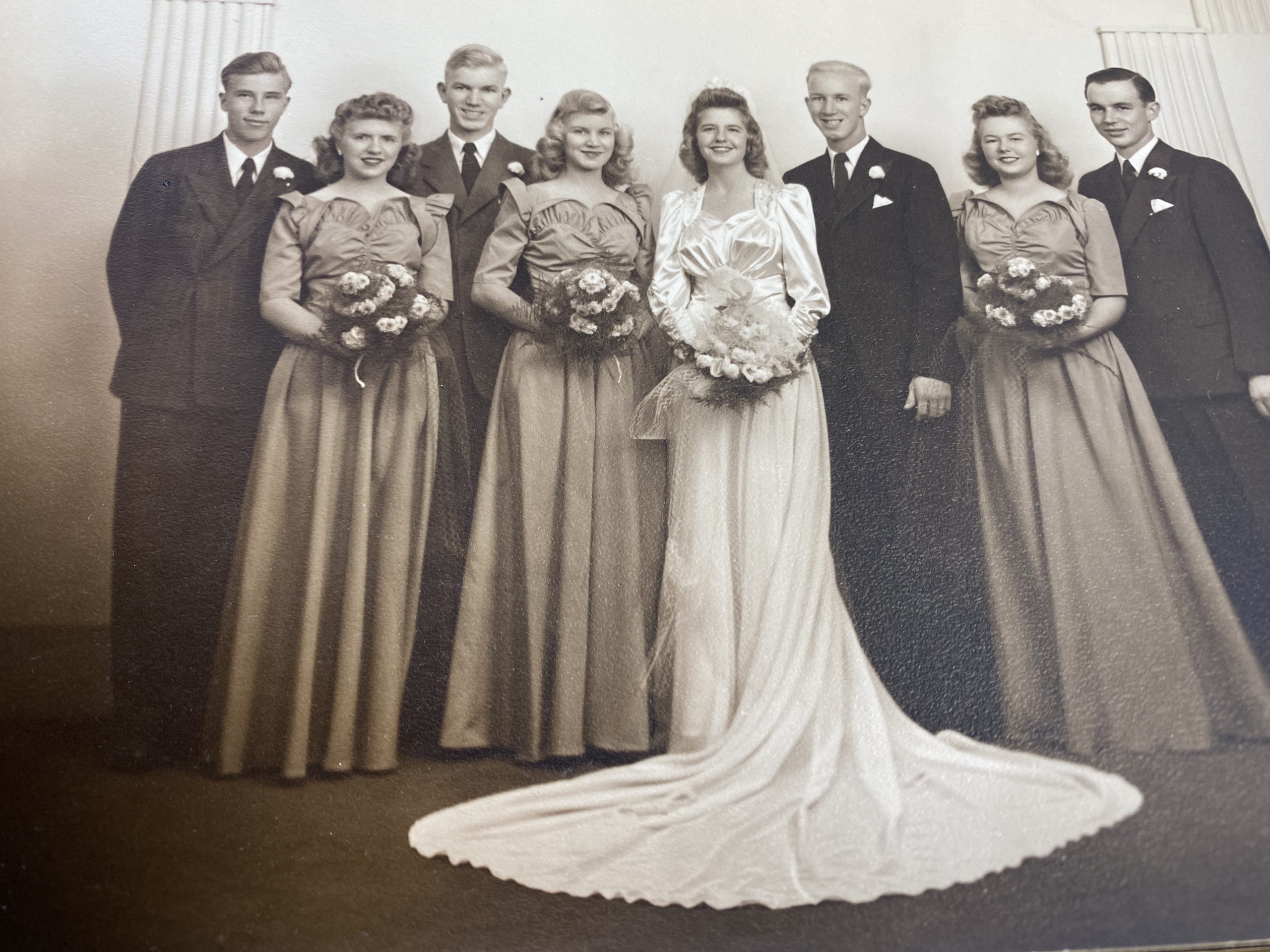For as long as I can remember, my mother struggled with mental illness. Back when I was a young boy, they called the malady ‘manic-depressive disorder’. In the 1960s, the treatment regimen was harsh, given the lack of appropriate medications to deal with the illness. The approach would later be regarded as somewhat cruel and barbaric . Later, the understanding of the illness and treatment protocol changed. My mother was labeled ‘bi-polar’. Fortunately, better treatments were developed that helped her live a fruitful life.
Her own background of being abused may have been to blame. But to me, she was just ‘my mom’. When I was eight years old and my mother needed to go the psychiatric hospital for three weeks, I didn’t ask about the origins of my mother’s ‘problem’; I simply got on with coping with the situation. My father left the family for alcohol, gambling, and other vices, when I was barely one year old. My mother is shown in her wedding picture above. She was very striking in beauty and abilities, but, hindered by her illness and now without a husband and an income, she was left to raise three boys on her own. By the time we had to leave our two-story family home in a wealthy, suburban area into a rental unit, I was 6 years old and my brothers were 14 and 16 years old. To say I was ‘the baby of the family’ was almost an understatement. Soon, my brothers were out of the house on to living their lives and I was left to deal with my mother.
She was extraordinarily committed to providing for the family through whatever secretarial work she could find, working in poorly paying jobs to finally making a decent living as a legal secretary for a large utility company. But the cycling between being ‘stable’ and ‘manic’ and, eventually, into the hospital, would continue well into my college years, when better medication became available.
For me, learning to live with someone with mental illness was simply part of my life. Yet, at the same time, we went to church every Sunday and I enjoyed quite a ‘normal’ life of being in school, playing youth sports, and having good friends who had parents who knew our situation. But it was painful when my mother’s mania ‘collapsed’ and she would become nearly suicidal in her depression. We would call the ambulance and I would again be visiting her in the psychiatric hospital. I now know that wasn’t a ‘normal’ life for a young boy. I knew my mother’s brain was not working as it should and when she was properly medicated, she was highly functioning and even fun to be with.
God’s Consistency in a Life with Trouble
Attending Sunday worship was a consistent part of my life. I can still remember entering the beautifully appointed sanctuary as if it was a stable part of life. Every week, just before the liturgy would begin, the well-trained choir would sing:
The Lord is in His holy temple;
The Lord is in His holy temple;
Let all the earth keep silent;
Let all the world keep silent, before Him.
We did keep silent until the minister would get up and lead us in singing, worship, a sermon, communion, and (finally, in my mind) the benediction. Although I would occasionally complain about the length of the worship service, I now know that it was a constant ‘place’ in a chaotic life.
After college and then seminary training, I entered pastoral ministry. One thing you learn in pastoral work is that every family has its own form of ‘trouble’. The whole family needs the reassurance of God’s love and care. We (not just clergy, of course) are people who are the hands and feet and voice of God at key times. Entering into the painful spaces of another’s life is a huge privilege. Most people and family systems try to hide the ‘trouble’ they are in. That’s understandable, but sad. Fortunately, my training with my mother’s malady made it easier for me to understand what people were dealing with. My ‘pastoral training’ started when I was very young, learning to ‘see’ that mental illness did not mean that my mother was ‘bad’ (though she said some awful things to me during her low times). I was able to grasp, by God’s grace, that my mother was sick and that, soon enough, she would be on proper medicine and we would continue our lives, cycling in and out of what people called ‘normal life’.
In all of these strange times of my youth, I always sensed God’s presence. His people showed up at key times. We had a plaque that was on the wall at our kitchen table with Psalm 46:1 on it:
God is our refuge and strength,
A very present help in trouble.
Perhaps this plaque was more fitting in my house because I never knew when my mom’s ‘trouble’ would come back. But God was our refuge and strength.
My Reason for Hope
As we launch our course, Surprised by the God of Hope, with Prof. Wright, I am again amazed that in the midst of my mother’s struggles, we never lost hope. I knew there would be a day when she wouldn’t be troubled by a mind that betrayed her.
As my own theological studies progressed in my adult life, I understood that the hope of a Resurrection Body and a New Heaven and a New Earth, renewed by the Risen Christ, was my true hope. My mother, who trusted in Jesus as her Lord, will be raised up again, but with a renewed mind, no longer tortured by her illness.
In 2012, when my mother approached the end of her life in a nursing care facility at age 87, she weighed about 70 pounds. Because of her ‘need to talk’ (part of her manic side), she would forget to eat. She gradually lost more and more weight and finally drifted off into her final rest. I was at her bedside the moment she passed into the presence of Christ. I know she is resting with Christ, which is far better, awaiting the Day when she will be made new.
This story brings us to today. The course, Surprised by the God of Hope, is an extraordinary reminder we need for today: God’s Hope Is Ever Present. The Bible is the story of God’s faithfulness in giving hope for today (‘an ever-present help in trouble’) as well as hope for the ultimate Tomorrow, when God will renew all things. The earth will become the ‘no tears place’ as it was meant to be.
One of our students who lives in the UK is battling with Stage 4 cancer. She enrolled in our course, Surprised by the God of Hope, with Prof. Wright. As she walks towards the end of her life, she wrote about Prof. Wright’s book written years earlier, Surprised by Hope:
Being on palliative treatment for life-limiting illness, this book, ‘Surprised by Hope’, did indeed take me by surprise. A mature Christian, I am presently facing that dark uncertainty of the finality called death, struggling with pain and anxieties as never before. This book has done and is doing, as no other theology book has, an amazing work of grace to clarify my faith and hopes of what it is I can look for in Christ, and the certainty of what it is He is leading me to beyond the veil: to understand, as much as is possible, the nature of that resurrection life sealed for me in Christ, while still on this side of the thin divide between life and death. I and my husband so look forward to these sessions (of Surprised by the God of Hope) in the run-up to Easter 2021. when we will celebrate once more our Lord’s resurrection, as Truth of truths.
Eastertide in a Pandemic
As we march towards Easter in the midst of a pandemic, reflections on God’s faithfulness to his word are even more important. The Book of Hebrews reminds us in Chapter Eleven of all the people who lived and died in faith. We, ourselves, think of dear ones who have died rich in faith. Jesus said to the Jewish leaders, in reference to His body, ‘Destroy this temple and in three days I will raise it up’. Indeed, Jesus was raised from the dead, never to die again. It is in this hope that we live and to this hope we point others.
Let’s not ‘waste’ the season of Lent, Good Friday, and Easter. We walk the path as a yearly reminder that:
God is our refuge and strength,
A very present help in trouble.
Our greatest ‘trouble’ is death, which Messiah Jesus has overcome. And we will share in that resurrection life. Hallelujah.
When my mother passed away, she was a ‘shadow of her former self’. But what we can and should say every day, as Prof. Wright has encouraged us to say: We are now a shadow of our future selves!
David P. Seemuth, PhD
Latest posts by David P. Seemuth, PhD (see all)
- Advent Reflections from the N.T. Wright Online Team - December 5, 2022
- YouTube as Public Reading of Scripture - August 29, 2022
- What I Learned From A Week With Professor Wright - June 16, 2022




![[Video] There’s more to ‘joy and peace’ than you might think](https://www.ntwrightonline.org/wp-content/uploads/2021/03/tamara-menzi-HQ_Vh1fSWHk-unsplash-500x383.jpg)

